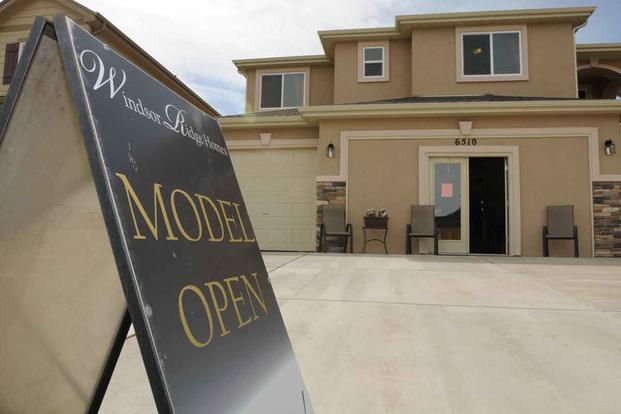

Editor’s note: The information contained in this article is incorrect. Veterans who obtain VA home loans now have the option to pay broker commission fees.
Some commission fees for real estate agents will soon be covered under the Department of Veterans Affairs‘ home loan program, according to a new VA policy announced Tuesday.
Veterans Affairs-backed home loans will now include commission fees for buyer-brokers who represent home purchasers amid ongoing changes nationwide to real estate transaction fees and commissions.
Previously, active-duty service members, veterans or eligible spouses who applied for a VA loan could not use the benefit to pay fees to real estate agents they hired exclusively to represent them. In most traditional real estate arrangements, buyers signed a contract with an agent to show them houses and negotiate a deal, but the seller was responsible for covering the commissions of the selling and buying agent, usually between 5% or 6% of the purchasing price split evenly between the two.
Read Next: White House ‘Strongly Opposes’ Proposed 19.5% Pay Hike for Junior Enlisted Troops
As a result of a class-action settlement involving the National Association of Realtors, or NAR, earlier this year, however, that math may be changing.
Sellers in Illinois and Missouri sued the NAR, charging that the association’s practice of requiring agents to list agent compensation on the nationwide real estate database, known as the Multiple Listing Service, inflated commissions by encouraging agents to advertise the highest amount.
The lawsuit contended that the practice also encouraged buyers’ agents to show only homes that offered top commissions, depriving buyers of seeing all available homes and preventing sellers from offering discounts to draw shopping interest.
Under the settlement, the National Association of Realtors agreed to pay $418 million to plaintiffs and denied any wrongdoing in requiring that brokers include commission rates on the MLS.
But the agreement barred seller agents from posting commissions on the MLS, and it also required agents working with buyers to enter into written contracts with buyers, effective mid-July 2024, although many firms started requiring those agreements shortly after the settlement was announced.
Buyer-broker agreements spell out the services a real estate agent will provide to the buyer and require the buyer to agree to pay the agent a certain percentage of the purchase price in the event the seller’s agent does not cover some or all of the commission.
This could mean, for example, that a veteran who buys a $350,000 house would be responsible for paying their real estate agent between $8,750 and $10,500 if the agreed-on commission was between 2.5% and 3%.
Now, the VA will cover those costs. According to the department, the move is designed to ensure that veterans are not disadvantaged in the real estate market.
“We always want to put veterans and their families in the best possible position to buy the homes they want, and that’s what this update is all about,” VA Under Secretary for Benefits Joshua Jacobs said in a release.
“Veterans using VA home loan benefits can now pay reasonable and customary amounts for certain charges — including commissions and other broker-related fees — thus ensuring that they remain competitive in the rapidly changing housing market,” Jacobs said.
Department officials said the change is temporary, and the VA will monitor how the settlement affects real estate transactions moving forward and adjust as needed.
The VA has provided low-cost, lower-interest home loans to veterans since 1944, responsible for more than 28 million loans in the past 80 years.
The benefits for buyers and lenders are better loan terms, favorable interest rates, and lower down payments and loan guarantees, ensuring that if a veteran homeowner goes into foreclosure, the lender will recoup some or all of its losses.
In its release, the VA reminded homebuying veterans that they can negotiate buyer-broker fees and commissions and are encouraged to do so. They also can ask the sellers to pay those fees at closing, which has “long been and continues to be a viable practice under VA’s rules.”
“As the landscape of the real estate market evolves, VA will continue to monitor for changes as well as new models for realtor commissions that may emerge and help lower costs, boost competition and increase avenues to home ownership,” department officials said in a release.
Related: VA Pauses Foreclosures on Veterans Facing Difficulties Making Mortgage Payments
